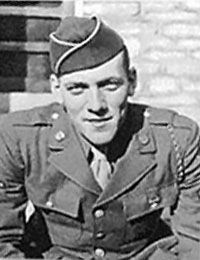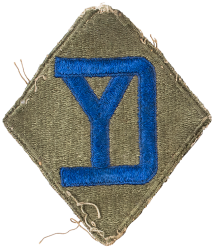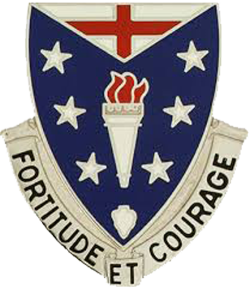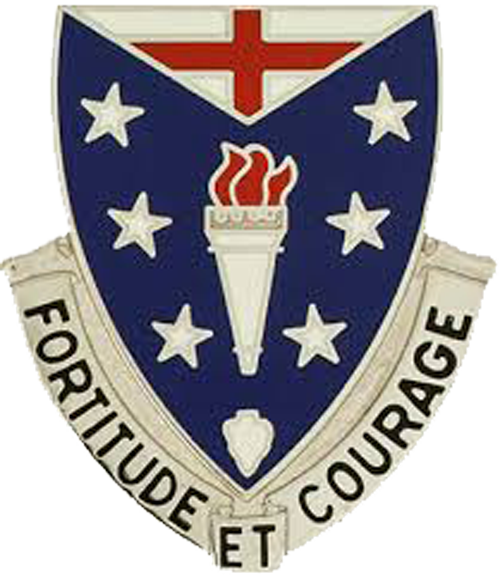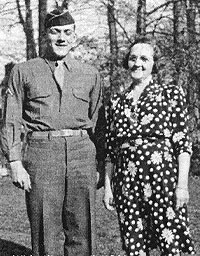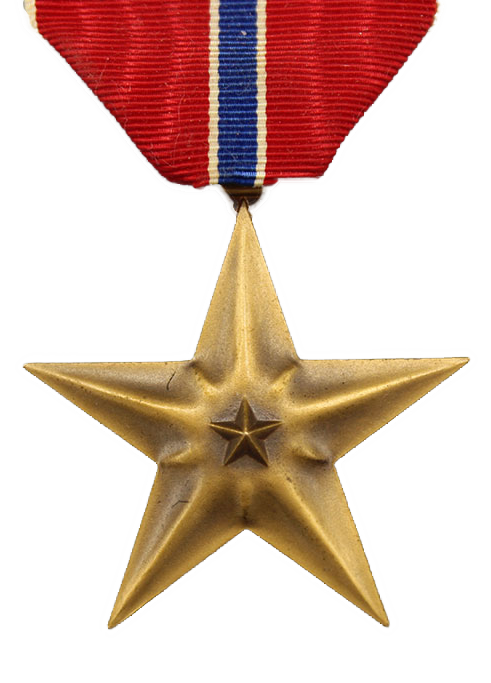Even though the Allies had air superiority throughout the European Theater of Operations the Luftwaffe was not completely inactive. They still ran strafing and bombing missions and were always anxious to destroy supply dumps and prevent reinforcements from getting to the front lines; Cherbourg had been hit a number of times. Probably due to this, together with good planning, or possibly due to good luck we didn’t waste much time loading onto trucks and getting away from the port area once our feet were on terra firma. It was only a short distance to the Valognes Staging Area which was to be our home for the next several weeks while the Division’s heavy equipment - artillery, trucks, etc. - that material I had been packing back at Ft. Jackson - was unloaded and prepared for use. Cherbourg is located on the Normandy Peninsula, somewhat west of the Omaha invasion site, the Valognes Staging Area is situated between the two and in a “hedgerow” area. My Company was finally bivouacked in a small field completely fenced in by hedges. As there were no barracks we had the great good fortune to call pup tents our home. Of course, our barracks bags did not catch up to us for some time and clean clothes were at a premium.
The Army, with its typical efficiency and insight, wanted to preclude our minds from becoming the Devil’s Workshop and immediately got us back into training, honing our skills in preparation for combat. Of course rumors were rampant about our destiny - the war in Europe was essentially over, Patton would cross the Rhine in the next two weeks, we’re to be reassigned to a Phantom Army bound for the South Pacific - use your imagination and it became a rumor. But for now it was close order drill, inspections, weapons maintenance, classes on aircraft and tank silhouettes and other intensive last minute training. This training brought us in daily contact with the realities of war. There were some dead German soldiers and animals still awaiting burial in our immediate area, we took marches to the invasion beaches to see the destruction and enemy emplacements.
Even went through St. Mere Eglise where our paratroopers had been so badly cut up. Some of our Engineer Battalions were detailed to clear mine fields around the beaches. And, yes, we learned by doing as we suffered casualties as a result of straying into mine fields and lives were lost to an occasional tripped “Bouncing Betty” mine. Believe it or not we even got a slight hint of combat during our inactivity as the Division was placed in strategic reserve during the Battle of Brest. At this time it was suspected that the 26th , together with the 44th and 104th Infantry Divisions, was being assembled as a nucleus for the new Ninth Army which was being organized.
Living in pup tents made for some little difficulty particularly when it came to clean, dry clothing. The rains were continuous - it was only a matter how much it rained each day; the ground was soaked, we were soaked, our clothing and equipment was in a constant state of dampness, yet the “brass” expected us to maintain an appearance of garrison neatness. Humbug. No laundry facilities were available so we did as best we could - one day several of us came upon a discarded 10 gallon tin can which we turned into a wash tub removing its top and fashioning a handle using some discarded telephone wire. Into the can went some water, underwear, fatigues and a generous supply of yellow (Fels Naptha) soap.
We hung the tub over an open fire and left it stew for awhile to get rid of the jungle bunnies and anticipated removing our duds, now freshly cleaned and smelling good. It wasn’t to be,- we had too little water and too many clothes; my fatigues - which had been on the bottom - caught the brunt of the whole operation and came out charred and quite holey. Net result - instead of two sets of fatigues I was reduced to one - my lot had not improved. However, somehow I replaced the burnt clothing and smartened up by paying one of the local French housewives to do my laundry. How true, we get too soon old and too late smart. Recreation was pretty sparse. I believe we had an occasional movie but I don’t recall anyone getting passes to the local towns. In any event the towns were beat up and not prepared to handle any influx of GI’s.
The only organized sports we had was softball. Fortunately I had played in a YMCA League before entering the Army and could hit and play outfield decently and made the Battalion Team. This provided some break as I was relieved of menial duties to play scheduled games with other teams throughout the division. During the first two weeks of September the Allied Forces made rapid advances across France; particularly the Third Army under General Patton. They had advanced nearly to the Moselle River and were badly exposed on both flanks.
The brutal fact was that insufficient supplies were being delivered to all the armies - basically, they were running out of gas and other materiels and supplies. As a result, much to Patton’s dismay, supplies were being diverted from the 3rd Army to other US and British Armies. Patton had run out of gas, he was bogged down. The proposed solution was to organize provisional truck companies to transport supplies to the front line troops - round the clock, seven days a week. Thus was born the Red Ball Express, who did just that. About 3000 drivers from our Division were assigned to this duty and served from September 15 through 28 when the 26th Division was released to General Patton in response to his clamoring for additional troops. The orders were cut, transportation and routing arranged and we were off to the front about October 4.
We made the trek with one stop in Fountainbleau for several hours and arrived in the vicinity of Athienville, France - just east of Nancy - on October 6. This was an active combat zone and, although no shells were bursting around the field in which we unloaded, continuous rumblings could be heard in the distance. Memorably, I have never seen truck drivers haul ass more quickly than ours did as soon as they deposited us. By 0230, October 7 our Battalion had relieved Combat Command B, 4th Armored Division of their defensive position in the vicinity of Arracourt.
The Bulge
Lieutenant Jim Bailey was a terrific officer; a good Ieader, brave, cautious, considerate, knew his business and above all was well thought of by his superiors and subordinates. Yes, he was adept at politics and well aware that risk to life and limb was inversely proportional to the distance one was from the lines. The success of our patrol group under Bailey’s leadership did not go unrecognized throughout t~e Regiment as well as the Division. It is not surprising then, in retrospect, to understand how, in the several days we were in Metz, Jim had talked the Colonel into including a Special Patrol Section in the the Regimental Headquarters Company. And just who formed the group? Bailey as leader; Jack Bombard, Tech Sgt (Bailey’s former Platoon Sergeant from “G” Company) Phil Lounsberry; the “Chief”, Ed Limes and myself. The others from our original group remained with 2nd Battalion with 5gt. Bob Snyder as leader. The change for us was that, when not on patrol, we were a bit further from the front lines.
However; our patrol objectives became somewhat more difficult since we were now responsible to a higher echelon of command who were greatly more critical about obtaining results. Luxembourg was well into winter when we arrived - it was cold, the ground was snow covered and it continued snowing off and on until we left in late January. Our, quick change in orders didn’t allow time to outfit the troops in winter clothing - many were without overcoats and had only medium weight or fatigue jackets and none of us had decent foot wear such a “snow-pacs”, although a few did scrounge galoshes. I was lucky because I had in some way obtained a set of tanker’s coveralls and jacket. These were ideal as they were heavy cotton twill lined with a wool blanket - warm, weather resistant and permitted maximum flexibility and comfort. Within a day or so after engaging the Germans we were issued white camouflage suits - a mixed blessing; when in snow - great; but with dark woods as a background, you stood out like a sore thumb.
On patrol we rarely wore them. The Kraut offensive was six days old and the confusion of their whereabouts was great - our Intelligence did not know just where they were. Accordingly, our orders were direct: Go north, through the snow storm until you bump into them. We had·been sent forward of the column of Battalions, the 2nd leading, and observed a column of Germans proceeding south. After we reported to Reg.imental Headquarters the 2nd Battalion engaged the Germans as they came face to face going opposite directions on the same road. Combat again; fighting in Lorraine was tough but the Bulge was rougher and tougher. It seemed everything was against us: the weather - snow and bitter cold; the terrain - rugged hills and dense woods; the enemy - fanatic troops, 55, Parachute and Panzer Divisions who were feverishly fighting in a tremendous effort to split the Allied Forces in two and drive a wedge completely through Belgium to Antwerp. The further north we advanced the stiffer the resistance became.
Christmas Eve, 1944
We found ourselves in Grosbous, Luxembourg, a few miles north of where we had first engaged the enemy. The line companies were several hundred yards forward attempting to drive the Germans from other villages, Dellen and Eschdorf. Our section and a several others were in a house still occupied by the owners - a fam ity of four; two parents and their daughters in their early teens. In one of the “Care Packages” I received from home had been a doll or some other small gift to give to a little French girl”. I believe some others had a trinket or so which we all gave to the Luxembourg lassies together with “Ho-’Ho’s and Bon Noels” all around. Phil and I attended a Christmas Eve Se’rvice ‘co”ducted by the Regimenta” Chaplain in a barncomptete with cows, a couple of sheep and the aromas attendant to such a location. The hood of the Chaplain’s Jeep served as the altar as we sang a few carols with the strained chords ofa portable organ as accompaniment, the Chaplain delivered a short message (which I don’t recall), no collection was taken and the service was hastily disbanded because some invasive artillery was landing too close for comfort. The barrage ceased shortly after returning to our billet and 1 was writing letters when Bailey called us all together.· I was shocked when he informed us that someone had attempted raping one of the little girls. Not an adult but barely a teenager.
Crap what next! Fortunately, this little girl suffered no apparent physical damage; emotional, who knows. One by one we were taken face to face with the girl for identification of the culprit. Of course we were nervous, for who could predict how accurately an emotionally upset little girl could identify a stranger’s face that she had seen only in a darkened room . However, she identified the same individual repeatedly. What a sad way to celebrate Christmas. The end of the story - the culprit was subsequently court-martialed and sentenced (I believe to execution). Amongst others I testified at the proceedings held in Grosbous in January, 1945. Dellen, Luxembourg was a picture perfect Christmas Day, 1944 - snow covered the ground under a magnificent, cloudless blue sky. Bailey had come across a camera and film so we had a photo-op.
